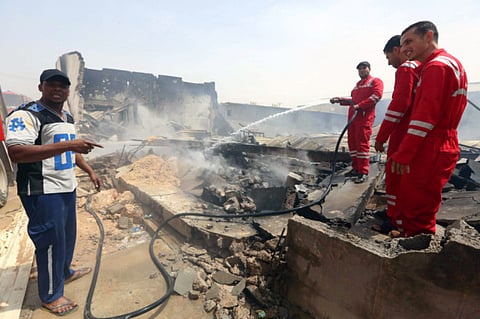Top Libyan air force official backs rebel general
Air force commander pledges to make the ‘new Libya a vital player in combating terrorism and violence’

Tripoli: The top commander of Libya’s air force has announced he backs a renegade general’s offensive against Islamist lawmakers and extremist militias, further building support from the country’s fragmented military for a campaign the government describes as a coup.
Col Juma Al Abbani, the chief commander of Libya’s air force, gave a televised address on Tuesday night in which he said his forces would back Gen Khalifa Haftar. Al Abbani pledged to make a “new Libya a vital player in combating terrorism and violence,” while calling upon all people to support the military.
Military units and commanders have made a series of loyalty pledges to Haftar’s Libyan National Army and his offensive on Friday against Islamist militias in the eastern city of Benghazi. Militias apparently allied to Haftar launched an attack on Sunday against Libya’s parliament as his group declared the lawmaking body suspended. Two days later, lawmakers tried to hold a session in an undisclosed location but came under attack by rocket fire.
Hours after Al Abbani’s announcement, witnesses said rockets targeted military camps in the capital, Tripoli. The bombings rattled residents but there was no word on casualties.
Haftar’s campaign comes as parliament, which saw its mandate expire in February, finds itself split between Islamist and non-Islamist lawmakers. Late n Tuesday, non-Islamist lawmakers and a voting bloc called the National Forces Alliance issued a statement apparently supporting Haftar, saying Libyans have found themselves “drowning in swamp of terrorism, darkness, killing and destruction.”
On Tuesday, Libya’s election commission announced parliamentary elections will be held on June 25, a top demand among most Libyans.
Since toppling Libya’s dictator Muammar Gaddafi in 2011, successive governments relied heavily on a myriad of militias, the heavily armed groups formed around ethnic identity, hometowns and religion that grew out of the rebel factions that toppled Gaddafi.
Bringing them under control has been one of the greatest challenges and one they largely failed at as militias have seized oil terminals and even kidnapped a former prime minister seemingly at will.
Haftar served as Gaddafi’s military chief of staff, but found himself captured by Chadian forces in the late 1980s. Authorities in Chad later released him and Haftar joined the National Front for the Salvation of Libya, the main Libyan opposition group at the time. Haftar later moved to Virginia, US and, in interviews with Arab media in the 1990s, described himself as building an armed force with US assistance to “eliminate” Gaddafi and his associates.
He returned to Libya and briefly served as a commander of its fledging national army after Gaddafi’s death. In February, he reemerged in Libya via a video in which he addressed the nation while wearing his military uniform and standing in front of the country’s flag and a map, proclaiming he intended to “rescue” the nation. Authorities described the video as a coup attempt, though he apparently was never arrested.



![Oman’s Maritime Security Centre confirmed four crew members injured. [Illustrative image. ]](http://media.assettype.com/gulfnews%2F2026-03-01%2Fv5np7wj5%2FOil-tanker.jpg?w=320&auto=format%2Ccompress&fit=max)